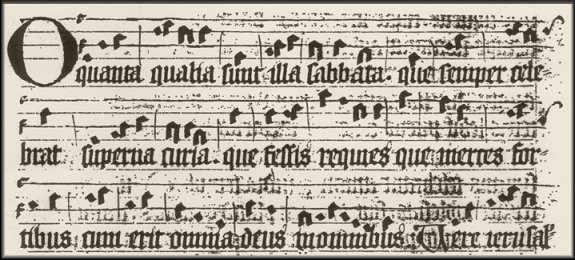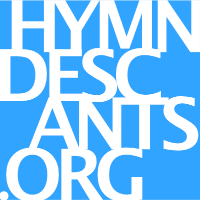Two hymnal verses - motet (two equal voices) - free harmonization - harmonized descant
1
O what their joy and their glory must be,
those endless Sabbaths the blessèd ones see;
crown for the valiant, to weary ones rest:
God shall be all, and in all ever blest.
2
Truly, "Jerusalem" name we that shore,
city of peace that brings joy evermore;
wish and fulfillment are not severed there,
nor do things prayed for come short of the prayer.*
3 study: motet in two parts
There, where no troubles distraction can bring,
we the sweet anthems of Zion shall sing;
while for thy grace, Lord, their voices of praise
thy blessed people eternally raise.
4 Unison with alternate harmonization
Now, in the meanwhile, with hearts raised on high,
we for that country must yearn and must sigh,
seeking Jerusalem, dear native land,
through our long exile on Babylon's strand.
5 descant
Low before him with our praises we fall,
of whom, and in whom, and through whom are all;
of whom, the Father; and in whom, the Son;
through whom, the Spirit, with them ever One.
*the sense of the Latin is that in the heavenly Jerusalem you will desire for nothing - the heavenly reward is already greater still than anything you could think to ask. This is echoed in a collect from the Book of Common Prayer, "Pour into our hearts such love towards you, that we, loving you in all things and above all things, may obtain your promises, which exceed all that we can desire."
Peter Abelard, or more accurately, Pierre Abélard, was renown for a number of things - secret (and forbidden) love, provocative theology, and....hymns. Because this text survived transport to modernity, O quanta qualia sunt illa sabbata ('O how much, how great the [endless] sabbaths') it is generally the most well known, the English translation in universal use that of John Mason Neale (1854). Despite the complications of life and theology, Abelard was nevertheless highly regarded for poetry, his singing, and his application of music to liturgy; he composed entire sung offices as well as a collection of hymns to a convent headed by... his wife? (The saga of Abelard and Heloise is legendary, and if there is any marriage than man could not put asunder, it's this one. Note that their reationship began in 1115, eight years before the papal enforcement of celibacy.) His tunes were written in squiggly-line neumes, therefore the originals are uninterpretable today; if any others emerged from the scriptorium in square-note neumes, they are so far undiscovered. The setting is an adaptation from the family of 'French diocesan tunes,' this one from the Paris Antiphoner of 1681, based on an intervening 1808 derivation found in a method book for cantors by Francois de Feillée, with the Michaelmas hymn Regnator orbis. This tune, then has two eponymous names from underlying hymns, one from Abelard, O QUANTA QUALIA, the other from Jean-Baptiste du Santeuil, REGNATOR ORBIS. It joins tunes such as HELMSLEY, CAELITES PLAUDANT, ADESTE FIDELIS, and ROUEN that were originally engraved in these antiphonaries in square notation parts that cantors and singers would have been familiar with. Harmonizations for organists were collected in separate volumes and printed in modern notation. Helmore's setting reduced the meter to fit Neale's transalation, which was rendered in 10 10 10 10. Seven years later, the now familiar harmonization was arranged for Hymns Ancient & Modern by John Bacchus Dykes.
The setting is an adaptation from the family of 'French diocesan tunes,' this one from the Paris Antiphoner of 1681, based on an intervening 1808 derivation found in a method book for cantors by Francois de Feillée, with the Michaelmas hymn Regnator orbis. This tune, then has two eponymous names from underlying hymns, one from Abelard, O QUANTA QUALIA, the other from Jean-Baptiste du Santeuil, REGNATOR ORBIS. It joins tunes such as HELMSLEY, CAELITES PLAUDANT, ADESTE FIDELIS, and ROUEN that were originally engraved in these antiphonaries in square notation parts that cantors and singers would have been familiar with. Harmonizations for organists were collected in separate volumes and printed in modern notation. Helmore's setting reduced the meter to fit Neale's transalation, which was rendered in 10 10 10 10. Seven years later, the now familiar harmonization was arranged for Hymns Ancient & Modern by John Bacchus Dykes.
Image: Bibliothèque de Zurich, 1459 version still in liturgical use today, not the original version.
1 O what their joy and their glory must be,
Those endless Sabbaths the blessèd ones see;
Crown for the valiant, to weary ones rest:
God shall be all, and in all ever blest.
2 Truly, "Jerusalem" name we that shore,
city of peace that brings joy evermore;
Wish and fulfillment are not severed there,
Nor do things prayed for come short of the prayer.
3 There, where no troubles distraction can bring,
We the sweet anthems of Zion shall sing;
While for thy grace, Lord, their voices of praise
Thy blessèd people eternally raise.
4 Now, in the meantime, with hearts raised on high,
We for that country must yearn and must sigh,
Seeking Jerusalem, dear native land,
Through our long exile on Babylon's strand.
5 Low before Him with our praises we fall,
Of Whom, and in Whom, and through Whom are all;
Of Whom, the Father; and in Whom, the Son;
Through Whom, the Spirit, with Them ever One.
REGNATOR ORBIS
Set includes vv 3, 4 , and 5
O what their joy and their glory must be (v.5)
Low before him with our praises we fall,
Of whom, and in whom, and through whom are all;
Of whom the Father, and in whom the Son,
Through whom the Spirit is ever One.
– Peter Abelard (1079-1142)

